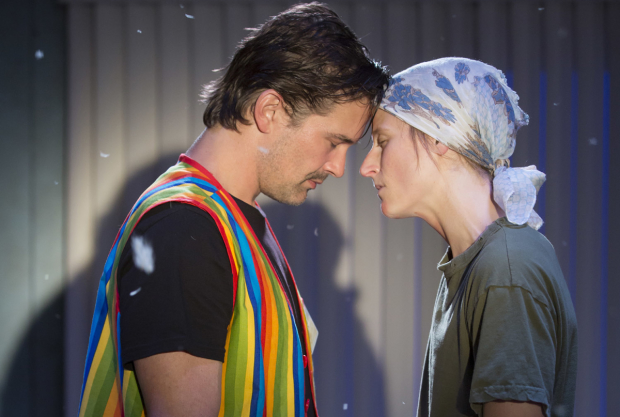Ugly Lies the Bone
Mamie Gummer stars as a disabled war veteran in the new Roundabout Underground world premiere.

(© Joan Marcus)
A wounded soldier's homecoming is at the center of Roundabout Underground's latest world premiere, Ugly Lies the Bone, written by Lindsey Ferrentino. It's a familiar story, but one that is never given time to grow stale as each generation claims its own identifying military tragedy. Ferrentino finds a particularly theatrical niche for her variation on the tale, harnessing the technology of both modern warfare and modern rehabilitation to build a distinctly 21st-century narrative.
Mamie Gummer stars as Jess, a thirtysomething Florida native who returns home from a third tour in Afghanistan with third-degree burns covering the right side of her face and body (impressively realistic prosthetics by Vincent T. Schicchi and Thomas Denier Jr.). As women now approach only their third anniversary of combat privileges, Gummer subtly assumes the face of military "progress," portraying a character who is forced to celebrate her newfound political equality with dozens of painful reconstructive surgeries. Yet what embeds Ferrentino's story most thoroughly in our current political and social climate is that no mention is made of her gender. She faces her recovery with the stoicism of any honorable soldier and victim of technologically advanced warfare.
Ironically, Jess' tech-savvy generation may even be the key to her recovery. The play follows Jess through video-game therapy — a new method of pain control that immerses patients in a virtual reality to distract their minds from physical anguish (Caitlin O'Connell plays the voice of the game-operating technician). At one point, we get to see what Jess sees, as projection designer Caite Hevner Kemp displays a snowy landscape on the curtain behind her (an homage to the game SnowWorld — a real-life game used to treat burn victims). But for the most part, director Patricia McGregor leaves the world inside the goggles to our imagination. She draws a simple scrim across the stage to sever this utopia of snow angels and penguins from Jess' real world where she faces constant pain, gruesome flashbacks, depressing job prospects, and a mother who suffers from Alzheimer's and whom she avoids out of fear that her scars will render her unrecognizable.
In this less desirable world, Jess lives with her perpetually perky sister, Kacie (an excellent Karron Graves), showing the strain of her new sisterly responsibilities beneath her porcelain smile. Much to Jess' chagrin, Kacie has taken up with the heavily bearded deadbeat Kelvin, the picture of slovenly America played by a perfectly infuriating Haynes Thigpen. He comfortably lounges in his Hawaiian shirts and capri pants, which Jess acidically mocks (costumes by Dede M. Ayite ), while relishing in the unemployment checks he considers a right owed him by his federal government (cue the steam pouring from Jess' ears). The only person Jess doesn't seem to mind interacting with is Stevie, a man from her pre-war life who now works a menial job at the local gas station (an infinitely charming Chris Stack).
Ferrentino is economical with her dialogue, packing both humor and sincere emotion (though with an occasional slight metaphor) into colloquial conversation — but Gummer offers an energetically charged and emotionally raw performance that brings the text to even greater heights. Every nerve in her body is visibly on fire while she militaristically guards her pain (both physical and emotional) with barbed wire. Only the genial, blue-collar Stevie can soften her sharp edges, as we see in a pivotal rooftop scene, which hits wonderfully poignant notes without the use of typical romantic tropes. Beyond recollections of an amorous past, the pair of exes hold up mirrors to each other's noses: Jess, reflecting on the ghost of her past self, and Stevie, facing the cowardice with which he's chosen to live his small-town life. The relationship offers so much baggage to mine that her domestic strife with Kacie and Kelvin and turmoil about reuniting with her mother (which is relegated to the sidelines for the majority of the play) become more distracting than informative. Ferrentino is at her best when writing through the tip of a laser: the insular world of pain, the claustrophobic routine of Middle America — this is the durable skeleton of Ugly Lies the Bone. The rest is just scar tissue.










